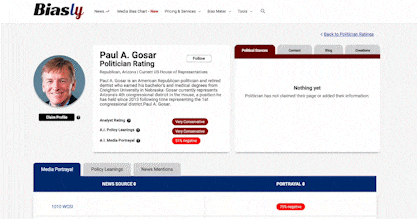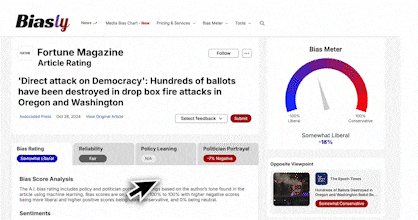Voucher bills want to prioritize low-income families and be open to all, but goals might be at odds
- Bias Rating
-12% Somewhat Liberal
- Reliability
80% ReliableGood
- Policy Leaning
-4% Center
- Politician Portrayal
-22% Negative
Continue For Free
Create your free account to see the in-depth bias analytics and more.
Continue
Continue
By creating an account, you agree to our Terms and Privacy Policy, and subscribe to email updates. Already a member: Log inBias Score Analysis
The A.I. bias rating includes policy and politician portrayal leanings based on the author’s tone found in the article using machine learning. Bias scores are on a scale of -100% to 100% with higher negative scores being more liberal and higher positive scores being more conservative, and 0% being neutral.
Sentiments
11% Positive
- Liberal
- Conservative
| Sentence | Sentiment | Bias |
|---|---|---|
Unlock this feature by upgrading to the Pro plan. | ||
Reliability Score Analysis
Policy Leaning Analysis
Politician Portrayal Analysis
Bias Meter
Extremely
Liberal
Very
Liberal
Moderately
Liberal
Somewhat Liberal
Center
Somewhat Conservative
Moderately
Conservative
Very
Conservative
Extremely
Conservative
-100%
Liberal
100%
Conservative

Contributing sentiments towards policy:
56% : " House Bill 3 and Senate Bill 2 - the signature school voucher proposals filed this year by each lawmaking chamber - would qualify virtually any family in Texas to receive taxpayer dollars through state-managed education savings accounts to fund their children's private school tuition.52% : Texas' HB 3 seeks to prioritize families in the following order: if more students apply than there are spots available: SB 2, meanwhile, would reserve 80% of spots in the program for students from two groups who exit public schools to attend private ones: children with disabilities and children from "low-income" families, which, according to the bill's definition, include those with an annual income up to roughly $156,000 for a home of four.
49% : Neither the House nor the Senate bill requires private schools to take the same state standardized tests issued to public school students every year, a measuring stick Texas Republicans rely upon heavily to make decisions about public schools.
46% : Now, many of the students currently benefiting from vouchers nationally had already attended private schools before signing up, meaning their families had previously committed to paying thousands of dollars in tuition without government assistance.
45% : Private schools in Texas host a predominantly white student population, a stark contrast to the majority Black and Latino student body in public schools.
45% : In addition, neither bill clarifies what would happen if a child makes it through the eligibility process but cannot find a private school in Texas to accommodate their needs. Advocates and experts say the bills' broad definition of low-income families - along with lawmakers' unwillingness to require participating private schools to guarantee access to certain student groups - will likely mean Texas' voucher program, like in other states, will end up primarily serving families who are already paying to send their kids to private schools.
45% : But that has not reassured public education advocates closely monitoring the two proposals.
42% : Supporters of education savings accounts say the voucher program needs to offer expanded eligibility to ensure every child in the state - including those from low-income families and students currently attending private school - can receive government assistance and thrive in parents' preferred educational setting.
39% : Barring a mass departure of students from public schools - which voucher supporters and budget experts predict won't happen - some public education advocates worry students from families already with the financial means to afford private school will take most of the program's spots.
*Our bias meter rating uses data science including sentiment analysis, machine learning and our proprietary algorithm for determining biases in news articles. Bias scores are on a scale of -100% to 100% with higher negative scores being more liberal and higher positive scores being more conservative, and 0% being neutral. The rating is an independent analysis and is not affiliated nor sponsored by the news source or any other organization.




























